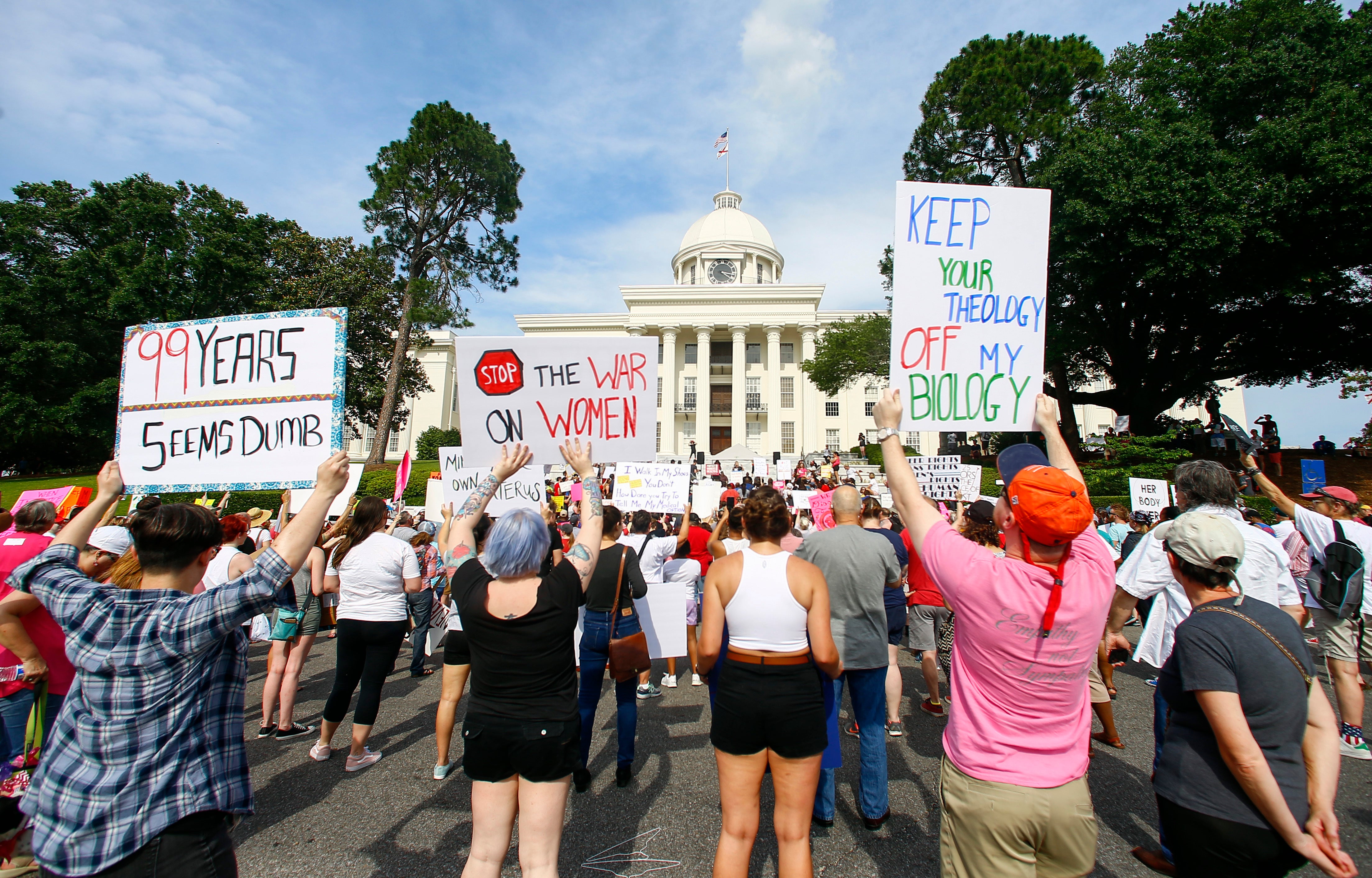Alabama’s ban on IVF left women out in the cold. In South Carolina, it’s a familiar tale
Women in South Carolina say they’re all too familiar with the consequences of laws banning medical procedures, writes John Bowden in Charleston


An Alabama court’s ruling this week putting the future of in vitro fertilization (IVF) at risk for thousands of families across the state hit the national discourse on abortion like a brick through its window.
Republican politicians scrambled to defend themselves, even as it was clear that the conservative fantasy of ending the protections of Roe vs Wade had been the direct impetus for the ruling. GOP figureheads from Speaker Mike Johnson to presidential candidates Donald Trump and Nikki Haley fell over themselves to come out in favour of IVF protections (thanks in no small part due to the comparatively wealthy status of families with financial access to IVF).
“Government doesn’t need to get into something this sensitive. This should be between the doctor and the parents. Period,” said Nikki Haley on Saturday, providing a quote that could have been copy-and-pasted from a pro-choice group after Roe’s demise.
But if the IVF ruling hit the political discourse like a brick, then its effects on the actual lives of Alabama’s families was more akin to a bomb going off. Already stories are trickling out from women who were days or even moments away from various stages of IVF treatment, only to be left high-and-dry by a court ruling that in some cases could leave them on the hook for thousands of dollars in money that is now essentially flushed down the drain.
“Now, even if I wanted to get them out of the state and do a transfer in another state or where my surrogate lives, I can’t,” one woman told NBC News. “I’m just kind of stuck until something changes down here, which – who knows how long that’s going to take?”
It’s a reminder that these court decisions have real effects on real lives. Banning a medical practice doesn’t just affect people in the future; it can outright ruin lives for people who are already in a vulnerable position.
Women in South Carolina have already learned that lesson.
The Palmetto State is the location of the next primary contest between Ms Haley and Mr Trump, the last remaining Republican candidates. Saturday’s contest will almost certainly be won by Mr Trump, who dominates control of the Republican electorate and has won every contest so far.
It’s also the site of one of the many localised fights over abortion rights that have erupted post-Roe. South Carolina’s Supreme Court allowed a six-week abortion ban to go into effect last August; now, pro-choice advocates including Planned Parenthood are leading a legal fight to define unclear language in the law in the hopes of pushing the ban threshold to nine weeks.
The women directly involved in this fight are no stranger to having their lives upended by a court decision. What they witnessed in Alabama this week was just the latest example.

“When I found out I was pregnant, I was four weeks. I had missed my period by two days and decided to check even though I thought, ‘There’s no way this could happen’. Because I had an IUD in place.”
Taylor Shelton is the lead plaintiff suing the state over the ban. Speaking just a day before voters in her home state participated in the GOP primary, she explained how even though she was responsible — tracking her period, using protection, and so on — the reality of the ban left her struggling with questions about what to do.
A week before she learned of her pregnancy, Ms Shelton says she received a clean bill of health from her gynaecologist, who also affirmed that her IUD was in place.
“I actually went to the gynecologist to get my IUD checked and kind of have a yearly checkup,” said Ms Shelton. “And she, you know, said that it was good to go and had no issues.”
After a pregnancy test revealed her status, Ms Shelton still wasn’t worried. After all, she was still well under the state’s six-week deadline. Or so she thought.
“Since I was under six weeks, you know, I was four weeks, so I felt I was in the clear. And then the next day, that Friday, I started calling around trying to figure out what I needed to do to get the abortion,” she said.
That’s when it was made clear: there were no appointment availabilities at any of South Carolina’s three remaining abortion clinics. Ms Shelton was going to have to defy the ban by leaving the state.
The problems only got worse from there. Once in neighbouring North Carolina, which bans abortion care after 12 weeks, Ms Shelton fell into a world of lies and deceit, all thanks to the anti-abortion movement. At a so-called “crisis pregnancy center” — fake abortion clinics known for misleading women of their services — Ms Shelton revealed a shocking and ugly side to the abortion fight that unmistakably carries the possibility of harming women both physically and emotionally.
“I went up to Charlotte, and it turns out this place was a fake abortion clinic,” said Ms Shelton.
“I knew that they couldn’t give me an abortion, but they did tell me that they could give me an ultrasound (required by law in North Carolina, twice, before an abortion).
After luring her to the clinic (a four-hour drive), Ms Shelton was informed by staff at the “crisis” centre that they weren’t going to give her the ultrasound. She had just wasted an entire day, with nothing to show for it — not even a benign medical test that could have revealed any actual health issues she could be facing.
“This woman … coerced me into scheduling an appointment, going driving up to Charlotte,” said Ms Shelton. “They said that you can’t do ultrasounds with an IUD in place, which is not true.”
Ms Shelton left “abruptly”, she told The Independent. But there was one more thing that happened before she did that really cemented the clinic’s dodgy image in her mind.
“They ended up giving me 100 bucks worth of gas like prepaid gas cards,” she quipped derisively. After offering her $50 initially, Ms Shelton said clinic staff upped their impromptu offer to $100 after a back-and-forth about a possible ectopic pregnancy (which would have been detected by the ultrasound they had just refused to give her).
“The whole thing felt like the black market.”
Ms Shelton did eventually get the treatment she sought. But she was clear-eyed in the knowledge that she had done so thanks to a family support system and a career that allowed her to work remotely. Many women, if not most women, do not fall into that category.
“I’m sad but also quite angry,” she says now, looking back. “It was really frustrating. Like the whole situation was unbelievably frustrating. And it’s really hard to be that vulnerable, and to be in a state like that.”
Her lawsuit takes aim at language around the so-called “fetal heartbeat”, seeking to push the ban back by three weeks. On paper, it’s not always clear what that means. But doctors in the state say it means everything.
Dr Katherine Farris, Planned Parenthood of South Atlantic’s chief medical officer, told The Independent that South Carolina’s ban had made as many as “85-90 per cent” of the typical patients at their clinics ineligible to receive abortion care. Moving that threshold to nine weeks would supposedly cut that number down by about half.
And like Ms Shelton, Dr Farris described the effects of South Carolina’s ban taking effect like an earthquake. She was inside one of the two clinics in the state where she provides care when the ban took effect, and had the experience of watching women who were in line to get the procedure receive the news that it was now illegal to treat them.
The desperation, sadness, fear and anger were all palpable.
“They were stunned that this could happen to them, that they could be at a doctor’s office about to get very critical life saving health care. And all of a sudden the legislature and a law takes away that right,” said Dr Farris, explaining the “shock and fear” she witnessed in her patients.
“They were very afraid that they weren’t going to be able to make it work,” she continued. “Some patients, understandably, are angry with us…I still see that anger. I still see the anger every day.”
Doctors and nurses who were present faced the brunt of their patients’ reactions.
“Many of us, if not all of us, were in tears at some point that day, knowing the impact this would have on our patients.”
Taylor’s story is far from unique. At this point it’s becoming more and more common, as horror stories from conservative states continue to appear, each one dealing body blows to conservatives in the media and constructing an image of laws and politicians leaving women in real danger. In Texas, the story of a woman who nearly died after she was denied life-saving abortion care is currently spreading like wildfire across cable news at the same time every Republican in the country is playing defence over the Alabama IVF ruling.
South Carolina is a deep-red state. But we’re in an election year, and these stories of women facing life-and-death situations thanks to legislation long seen as priorities for the conservative right are already putting Republicans at a disadvantage with a demographic that has increasingly spurned them in key races. Suburban women delivered the GOP defeats in 2020, 2022 and increasingly appear poised to do so in November, when in all likelihood Mr Trump will face off against President Joe Biden for the world’s least-desired rematch.
The spigot is not going to be turned off. Pandora’s Box is open, and stories about women being put in vulnerable circumstances are going to keep coming out until the laws change or American voters decide that it just truly doesn’t care. As of yet, there’s no sign of the latter happening — though some conservatives may wishfully hope that changes.
For Ms Shelton and so many others, this isn’t just politics. This is personal. This is as close to a “kitchen-table issue” as you can conceivably find; thousands of women, across the country, facing health issues, financial ruin and more all thanks to the activist conservative right appearing to embody the concept of a dog chasing and catching a car. If this week is any indication, the right has nothing — nothing — in the way of a response to these stories.
Something’s gotta give.
Join our commenting forum
Join thought-provoking conversations, follow other Independent readers and see their replies
Comments
Bookmark popover
Removed from bookmarks